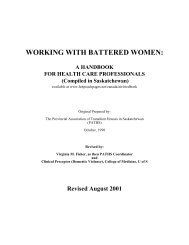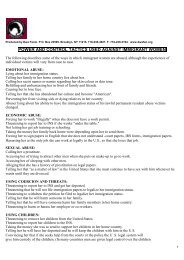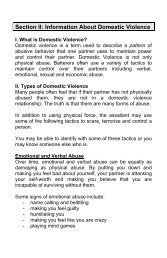Domestic Violence Counseling Manual - Hot Peach Pages
Domestic Violence Counseling Manual - Hot Peach Pages
Domestic Violence Counseling Manual - Hot Peach Pages
Create successful ePaper yourself
Turn your PDF publications into a flip-book with our unique Google optimized e-Paper software.
4. Termination<br />
• Agree on a concrete plan of action to be completed before the next session (safety plan)<br />
• Don’t promise things you can’t deliver<br />
• Encourage the counselee to come see you again, make an appointment if possible<br />
• Let the counselee do any evaluating of the session<br />
• Always ask if there is anything else that the counselee wants to talk about, often there is<br />
another problem that may be more serious, shameful, or embarrassing than the problem you<br />
have just spent your time discussing<br />
• Let the counselee be the one to end the session if possible<br />
• Go back over the other stages and check the progress of the session, re-discuss any areas that<br />
seem vague or incompletely covered<br />
5. Post-Session<br />
Being a counselor is not necessarily an uplifting experience. <strong>Counseling</strong> can feel like a<br />
“thankless” job, and you may feel that you aren’t really making an impact. You may feel helpless<br />
in the face of an apathetic legal and judicial system and centuries full of prejudice and myth. You<br />
may also feel that you’ve failed if the woman you are counseling doesn’t succeed. As a<br />
counselor, you just have to accept that your actions may not cause immediate change, but that<br />
every little bit you do does make a difference. By standing up for the rights of victims of<br />
domestic violence you are changing the consciousness of your society, and that is a courageous,<br />
admirable, and difficult thing. However, because counseling is such a hard job, it is very<br />
important that you take care of yourself as well as the counselee. The following are some good<br />
ways to avoid feelings of futility and burnout:<br />
• Talk with another counselor about the session and how you are feeling<br />
• Reflect on how you handled the situation—both what you did well and the spots where you<br />
felt unsure<br />
• Discuss with the other counselor how such a problem might be handled differently<br />
• If there is no one else available to talk to, try writing down your thoughts instead<br />
54-56

















